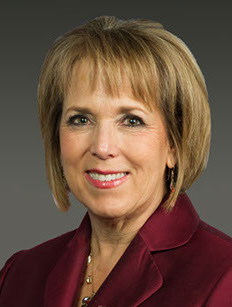
CAPITAL ROUNDTABLE
LATINA
LEADERSHIP
Comprised of Hispanic members of Congress, the Congressional Hispanic Caucus (CHC) is dedicated to voicing and advancing, through the legislative process, issues affecting Hispanics in the U.S. and Puerto Rico. For the first time ever, two Latinas serve as Chair and Vice Chair, Rep. Linda Sánchez and Rep. Michelle Luján Grisham, respectively. The nonprofit Congressional Hispanic Caucus Institute (CHCI) is also chaired by Rep. Sánchez, with Cristina Antelo of the Podesta Group as Vice Chair. Recently, LATINO Magazine broughts these three outstanding role models together for a roundtable discussion on Latina leadership.
LATINO Magazine: This is the first time that the CHC and CHCI have chairs and vice chairs that are Latinas. That’s a pretty historic occurrence. What kind of message are you hoping to send? Why is it important that Latinas are at the helm?
Rep. SÁnchez: The intention was not necessarily to send a message, but it does say to Latinas that we really have to lean in, and help other women lead, and I want the organization to reflect that. Our community is a young, dynamic and vibrant community, and we have great ambassadors in young Latina women, and I want to support that.
LATINO Magazine: What kind of initiatives would you like to see the CHC work on over the time of your leadership?
Rep. Luján Grisham: I would like to see us as a Caucus focus on long-term health care and care giving. It is an extremely complex issue that deeply affects our community. In particular, Hispanic women many times are primary care providers in their families and take on the role of managing care for elder family members as well as children.
Rep. Sånchez: One of the things as chair of CHC and CHCI that I’m working on is that too many people think that Hispanic electeds and officials only focus on immigration, or that it is the only issue that matters to our community. Immigration is important, of course, but we have many members of the CHC who are policy experts on many issues that face the US Congress, for example tax, financial services, and health policy, and we should use that as a resource. I plan to focus on each of my members’ expertise and help give them a platform to exemplify their contribution.
Additionally, Hispanics are also a young community, with many under 30 and 800,000 coming of voting age each year, and our educational system is letting them down and has to be more accountable to our community. Look at STEM education, for instance. In California we are a majority/minority state and Latinos shouldn’t be considered anomalies. Many companies still don’t take our community into account. It’s not intentional on their part, they just don’t know us. Earlier this summer, in June, we met with hi-tech companies in Silicon Valley to discuss the lack of Latino representation in their workforce and their plans to address that problem. Many didn’t even know what HSIs (Hispanic Serving Institutions) are. We are working with them to find solutions, and one of those recommendations is that instead of recruiting using the same old tools, let’s recruit using different methods, such as going to the HSIs.
Rep. Luján Grisham: In New Mexico for instance, there is an unbelievable growth in hi-tech businesses, but they still continue to hire without considering our local community. More hi-tech visas isn’t the long-term solution to our country’s innovating future—educating our youth is.
LATINO Magazine: On the issue of so few Latinos and Latinas in the hi-tech industry, as you both know, LATINO Magazine did an in-depth story recently on the lack of diversity. As you mentioned, the CHCI visited Silicon Valley to discuss those same topics. What kind of follow up will there be to address this concern?
Rep. Luján Grisham: At the retreat, not only did we have a roundtable discussion with several representatives from various technology companies, but we also had several one-on-one conversations with high-level leadership at some of the industry leaders. Many of them presented their thinking and ideas on how to move forward, best practices, and concerns on how best to improve. We are actively following up on these discussions and are really pushing for solution-based, real opportunities. This fall, we will issue a white paper summarizing our concerns with the industry, our conversations in Silicon Valley, and most importantly, our recommendations for real solutions. This focus on solutions and prescription for concrete steps to take is a key shift for CHC as we want to become partners with these companies seeking to improve opportunity for Latinos.
Cristina Antelo: Similarly, the lack of diversity in the hi-tech industry is mirrored in other industries, such as the finance industry where I got my start. There wasn’t a lot of diversity when I was in finance—not at the analyst level being hired out of college, not at the executive level and certainly not in the board room. Financial markets make the entire world go round. A lot of our students [CHCI Congressional Fellows] want to work on policy issues that impact our community, such as immigration and healthcare, but U.S. financial regulation also impacts our community. The SEC (Securities and Exchange Commission) is headquartered right here in Washington, and Congress also plays a role. Why not have fellows do an internship at the SEC, Treasury, Senate Banking, or in the government affairs office of an investment bank to see how important a grasp of financial policy is for everything else? If you don’t understand how the financial world works, how can you expect to have a seat at the board room table?
LATINO Magazine: As we look ahead to the CHCI conference you will host in Washington, DC this fall, what would you like for attendees to walk away with?
Rep. Luján Grisham: At election time, we hear about the importance of the Latino vote. It’s time we focus attention on the importance of Hispanic families and the issues that are important to us. I want the attendees to know they have the power to raise the level of debate, and hold officials accountable for making progress on the issues of import to our community. Latinos might not all agree on the most effective path to make college more affordable – but I think the vast majority think that should be a priority for Congress. The same is true for expanding STEM education opportunities; opening doors to the middle class; and helping working families find quality child care so they can earn a living.
Cristina Antelo: I would echo what the Chairwoman said earlier, we are not a one-issue monolithic community, and more importantly, we are paying more and more attention. Any industry whose workforce is 2% Latino, should not only be asked why, but asked for a plan for improvement. And if your answer is that Latinos don’t have the skills you need, then I hope you have some thoughts on how to change that. Moreover, I know there are certainly highly qualified lawyers and accountants—why isn’t there more Latino representation on corporate boards or serving as General Counsels or CFOs? With a growing number of Latinos elected to Congress, I think companies can expect to hear these questions more frequently and I hope that they choose to partner with organizations like CHCI as we collectively work towards solutions.
LATINO Magazine: What does it mean to you to be in a leadership position at CHC and CHCI?
Rep. SÁnchez: Leading the CHC and CHCI is an enormous privilege and responsibility. My goal is to ensure that the Latino community’s voice matches the power of its numbers so that our issues are front and center on the national agenda. When I was young I was lucky to have mentors that inspired me to serve my community. I feel like this is my opportunity to pass that on to our Latino youth. You are supported, you are encouraged, and we want to open doors for you. If we can embolden the next generation to lead, the power of our community will be that much stronger.
Rep. Luján Grisham: I am humbled by it. It is awesome. When we have women in these leadership positions, we can show that there are indeed opportunities to have an impact and make a difference and that it doesn’t have to take too long to get there. And I think it creates an impetus for others to do the same.
Cristina Antelo: For the last decade, CHCI interns and fellows have been a part of my experience in Washington…they have consistently represented the best and brightest of my community and their passion for policy experience and political learning is stunning. Never did I expect to become Vice Chair, but given the opportunity, I was elated to become involved. It is important for me to be part of the mission to develop the next generation of Latino leaders, and my only hope is that we can ensure this opportunity is available for more students and that it is preserved over time.

Rep. Linda Sánchez

Rep. Michelle Luján Grisham

Cristina Antelo